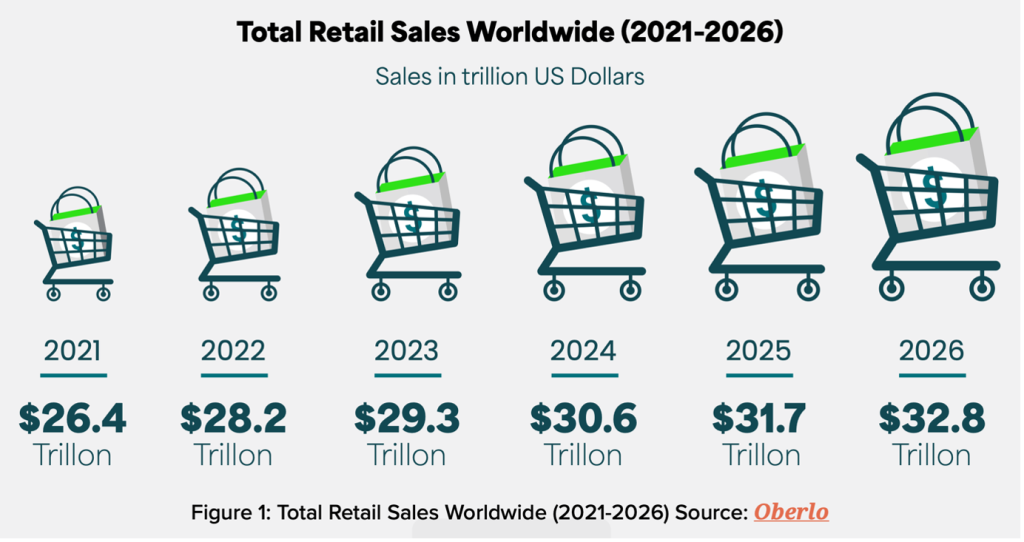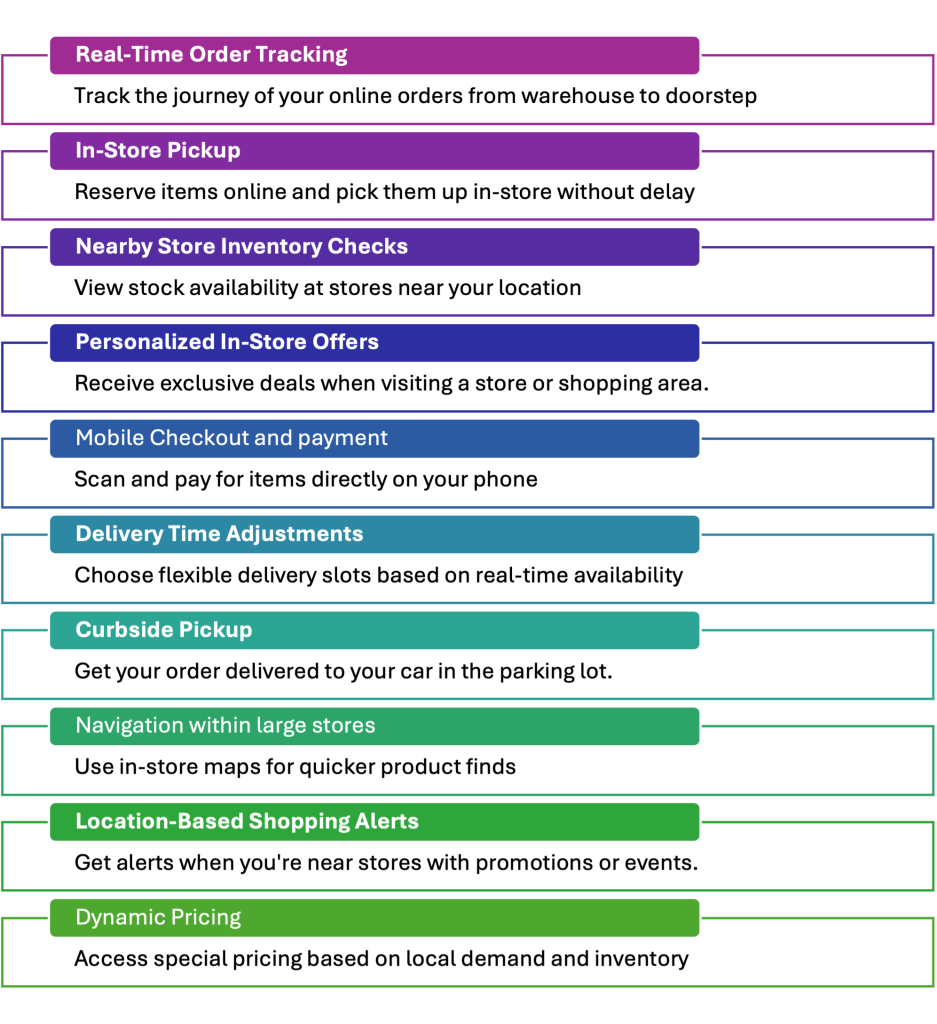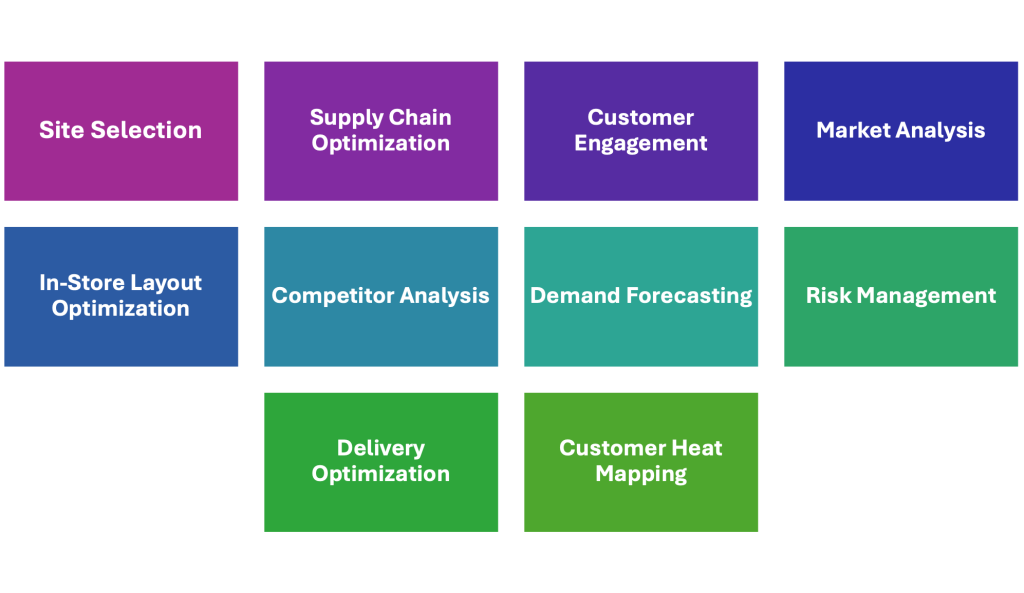Retail today is a rapidly evolving space, blending physical stores, online shopping, mobile apps, and social media into an interconnected experience for consumers. With global retail sales reaching over $28 trillion in 2022, driven by personalized services and accessible platforms, retailers now focus more than ever on customer experience, convenience, and data-driven personalization

What Can Shoppers Do with Location Tech Today?

These trends enhance convenience, personalization, and efficiency for today’s retail shoppers.
Where Geospatial and Location Technology is Making a Difference in Retail
Geospatial and location intelligence have become fundamental to how retailers enhance operational efficiency, customer engagement, and strategic planning. Here are key areas where these technologies are making a notable impact:

- Site Selection: Retailers leverage geospatial data to select new store locations, factoring in foot traffic, demographics, and nearby competitors. This data-driven approach maximizes exposure and revenue potential.
- Supply Chain Optimization: With location data, logistics teams can track shipments, manage inventory, and streamline delivery routes to reduce time and cost.
- Customer Engagement: Retailers use geolocation to personalize ads and promotions based on a customer’s proximity to stores, strengthening customer loyalty and satisfaction.
- Market Analysis: Geospatial insights help retailers understand market gaps, local demand, and growth opportunities, leading to better-targeted expansions.
- In-Store Layout Optimization: By analyzing customer movement within stores, retailers can optimize product placements, ensuring visibility and accessibility to increase sales.
- Competitor Analysis: Geospatial intelligence allows retailers to monitor competitors’ locations, offerings, and promotional strategies, enabling responsive adjustments to remain competitive.
- Demand Forecasting: Retailers predict demand variations based on local events, seasons, and trends, allowing them to stock effectively and prevent over- or under-supply.
- Risk Management: Geospatial data helps identify potential risks to locations, such as natural disasters or crime rates, allowing for proactive risk mitigation.
- Delivery Optimization: Analyzing traffic patterns and optimal routes reduces last-mile delivery time and operational costs, enhancing customer satisfaction.
- Customer Heat Mapping: Tracking real-time customer density in stores helps with queue management, staffing, and overall customer experience.
Emerging Trends in Retail with Geospatial and Location Intelligence
The retail sector is increasingly embracing technologies such as AI, machine learning (ML), and deep learning (DL) to better understand consumer preferences, behaviors, and trends. This fusion allows retailers to analyze both online and offline behavior, providing personalized recommendations that can improve product fit, suggest relevant cross-sells, and enhance customer engagement across digital and physical platforms. Indoor positioning and advanced mapping technologies, integrated with geospatial intelligence, are also critical in delivering seamless omni-channel experiences that meet the modern consumer’s demand for consistency and ease.
Where the Market is Heading
Retailers are moving toward a convergence of real-time data, location intelligence, and artificial intelligence capabilities. This shift enables them to better anticipate and respond to market trends and customer needs. Experts foresee a retail landscape where precision geolocation and location analytics will be essential for competitive growth, as they provide insights that traditional market analysis cannot match. The industry is also leaning toward hyper-personalization, which requires a solid foundation in geospatial intelligence to align with consumers’ real-time demands and preferences.
How Can GISKernel Contribute?
For geospatial companies, in particular for GISKernel Technologies, this shift presents significant opportunities to offer innovative solutions that meet the evolving needs of the retail industry. By providing advanced mapping, real-time location tracking, predictive analytics, and risk assessment tools, GISKernel can help retailers optimize operations and enhance customer engagement. Additionally, by developing solutions that integrate seamlessly with AI and ML, GISKernel can facilitate retailers’ journeys toward personalized, efficient, and data-driven strategies.
In this dynamic environment, GISKernel Technologies specializing in geospatial technology can become invaluable partners to retail businesses, enabling them to leverage data to achieve growth and sustainability in a highly competitive market.